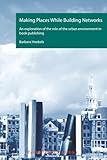Making Places While Building Networks. An exploration of the role of the urban environment in book publishing / Barbara Heebels.
Material type: TextPublisher: Amsterdam : Amsterdam University Press, [2012]Copyright date: ©2012Description: 1 online resource (184 p.)Content type:
TextPublisher: Amsterdam : Amsterdam University Press, [2012]Copyright date: ©2012Description: 1 online resource (184 p.)Content type: - 9789085550723
- 9789048517862
- 070.5
- online - DeGruyter
| Item type | Current library | Call number | URL | Status | Notes | Barcode | |
|---|---|---|---|---|---|---|---|
 eBook
eBook
|
Biblioteca "Angelicum" Pont. Univ. S.Tommaso d'Aquino Nuvola online | online - DeGruyter (Browse shelf(Opens below)) | Online access | Not for loan (Accesso limitato) | Accesso per gli utenti autorizzati / Access for authorized users | (dgr)9789048517862 |
Browsing Biblioteca "Angelicum" Pont. Univ. S.Tommaso d'Aquino shelves, Shelving location: Nuvola online Close shelf browser (Hides shelf browser)
Frontmatter -- Table Of Contents -- 1. Introduction -- 2. Creative Clusters In Berlin: Entrepreneurship And The Quality Of Place In Prenzlauer Berg And Kreuzberg -- 3. Performing In Dutch Book Publishing 1880–2008: The Importance Of Entrepreneurial Experience And The Amsterdam Cluster -- 4. Place-Making From Publishing House To Book Fair: Dutch Book Publishers And The Role Of Place In Establishing Trust And Reputation -- 5. Social Networks And Cultural Intermediaries: The Multiplexity Of Personal Ties In Publishing -- 6. Conclusions -- References -- Nederlandse Samenvatting
restricted access online access with authorization star
http://purl.org/coar/access_right/c_16ec
The Amsterdam ring of canals is a much beloved location for Dutch book publishers. An exposition of the meaning of this urban environment for publishers adds to the existing knowledge on book publishers and their business locations. It also contributes to our understanding of the role of urban place in cultural production by looking at cultural production from a relatively unexplored angle that of the cultural intermediary and by conceptualizing place as a dynamic concept. Publishers function as cultural intermediaries by bringing together the creation of cultural value and the selling of cultural products. An exploration of the meaning of urban place for cultural intermediaries in building reputation and trust in their personal networks with authors, booksellers, colleagues and the press, shows that place is more than geographical proximity and is not a static condition for knowledge spill-overs: it is a process, one that is interdependent on social networks.
Mode of access: Internet via World Wide Web.
In English.
Description based on online resource; title from PDF title page (publisher's Web site, viewed 01. Dez 2022)









